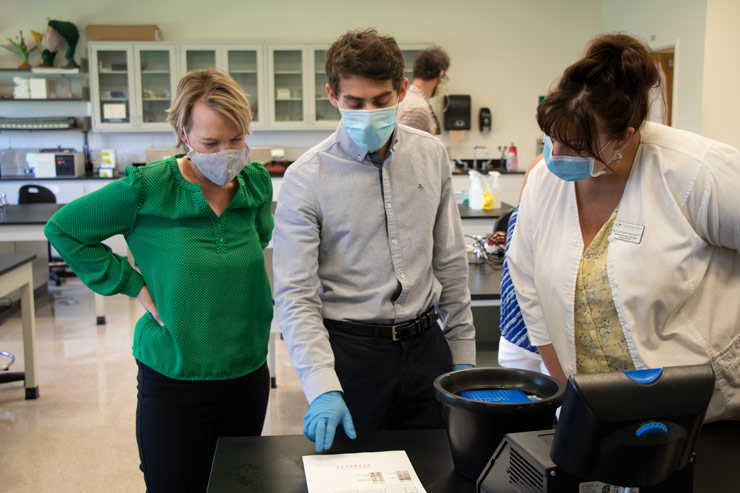New data dashboard will be introduced the week of September 7
As CMU prepares to enter the fourth week of the fall semester, the ability to respond to COVID-19 on campus and continue in-person learning is being bolstered through ongoing detection testing for coronavirus infections.
The university's baseline COVID-19 testing, which ran from July 27 through the first week of classes, resulted in early detection of cases prior to students returning to campus. This detection quickly honed the university's skills in responding to COVID-19 through contact tracing.
"Thanks to the tenacity of our team and partners, we created four testing centers across the state, complimented with at-home and third-party testing while we administered 9,014 tests," said Vice President John Marshall, who is co-chair of CMU's Safe Together, Strong Together (ST2) task force.
What's more critical in Marshall's view is the ability to quickly respond as cases are identified.
"Our on-campus testing site identified 20 of the 37 cases and enabled our team of contact tracers to work closely with partners at Mesa County Public Health to find, inform and isolate those impacted before they could broadly interact with the campus community," he added.
Beginning the week of August 24, the university launched its detection testing protocols, which will run through the end of the semester. Both the rapid saliva and wastewater testing pilot projects will help officials identify emerging cases on campus.
CMU continues with a multi-tiered testing strategy for the campus community that includes ongoing screening, detection and diagnostic methods. Ongoing detection testing is different than the baseline testing that was completed for the entire campus community. In this phase, we will be conducting sampling of the campus with a smaller number of individual tests, and when a positive case is identified, more strategic reflexive testing will be utilized to inform mitigation and containment strategies.
The current numbers on our dashboard shifted this week as we entered into the next phase of testing. The percent positivity will be increased now that we are performing strategic reflexive testing, targeting suspected cases and decreasing the total number of tests administered each week. We are working with a team from Mesa County Public Health to continuously improve our dashboard reporting to make the data more meaningful for the campus community. As the ST2 team looks to the future, work is underway on an enhanced data dashboard that will provide the campus and community with an expanded look into COVID-19 prevalence on campus. Amy Bronson, EdD, co-chair of the ST2 task force noted that, "having meaningful data is only as useful as our ability to communicate that information to our community and campus stakeholders." She added, "the dashboard is our way of doing that."
Also, with the support of students, faculty and staff leaders, we were able to launch the next step in detection testing today utilizing LAMP-Assay rapid saliva screening. Saliva testing offers additional scale and speed to our already robust testing program. We will keep the campus updated as we move ahead with implementing ongoing saliva testing as part of our detection testing.
Keeping our campus safe continues to be a top priority and we need everyone willing to do their part, to ensure we are able to stay on campus together. One important part of the safety equation is adhering to travel guidance. Our clear message will be and continue to be, please do not travel. We appreciate that all travel assumes some risk, but weighing the risks is important when making travel decisions. Working with Mesa County Public Health, we have updated travel guidance to reflect approved regional travel locations (Mesa, Montrose, Delta, Garfield, Pitkin, Rio Blanco, Gunnison, Ouray and Eagle Counties).
Remember, how we interact both on and off campus impacts our CMU community. Be safe this weekend, Mavs.
